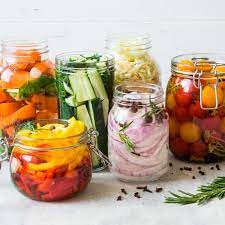Foods that are fermented have long been enjoyed around the world for both their taste and health benefits. Fermented foods are rich in probiotics, which can aid digestion and gut health.
A Japanese dish made from fermented soybeans, natto is rich in good bacteria and contains vitamin K2. It’s a great choice for people taking blood-thinning medication as it contains more of the plant compound glucosinolate than some cheeses.
Miso
Miso is a fermented soybean paste that can be found in the Asian aisle of many grocery stores. It is made by combining salt, soybeans, and koji (a type of fungus). The fermentation process can take anywhere from a few weeks to years. Miso is high in probiotics, which are helpful for digestion and gut health. Miso is also a source of umami, which gives food savory flavors. Use Fildena 150 and ED Trial Pack to improve intimate life. Developing lifestyle-related diseases within destiny by transforming general consumer behavior.
Studies have shown that miso can boost your immune system and protect you from illness. In addition, it contains isoflavones, which may help prevent breast cancer and lower blood cholesterol levels. It is also high in protein and magnesium.
The fermentation of miso produces several enzymes, which help digest foods and aid in the absorption of minerals and vitamins. This may be especially beneficial if your diet is low in raw fruits and vegetables or high in meat proteins and cooked grains. Miso can also improve your gut microflora, and studies have shown that it can help your body produce more of the vitamins you need to live a healthy life.
One of the reasons miso is good for your digestive tract is that it contains a particular strain of probiotics, called Aspergillus oryzae. This type of probiotic is known to support your gut’s natural good-bug bad-bug balance, which can reduce digestive issues like gas, bloating, and constipation.
Another reason to add miso to your diet is that it is a rich source of antioxidants. It is also a good source of omega-3 fats, which can lower cholesterol and blood pressure.
There are many different types of miso, but white and red are the most common. Yellow miso has a similar flavor to white, but it is less strong and contains a little bit more rice than the other types. It can be used as a condiment or an ingredient in soups and marinades. Miso is high in sodium, so it’s important to eat it in moderation. You should try to avoid adding it to already salty foods, such as processed meats and canned tuna.
Sauerkraut
Sauerkraut is a fermented food made from cabbage that contains probiotics. These bacteria help improve digestion and gut health by increasing the amount of nutrients absorbed by the digestive tract. Probiotics also prevent the growth of harmful bacteria. They can be found in many foods, including sauerkraut, yogurt, kefir, and kimchi. These bacteria can also reduce symptoms of depression, such as fatigue and stress. This is because the microbes in the gut have a direct impact on the brain.
Sauerkraut can be found in health food stores and large grocery stores in the refrigerated section. You should look for a jar or can that says “live and active cultures” to ensure that you’re getting the probiotics you need. It’s also important to avoid sauerkraut that has been pasteurized, as this process kills the beneficial bacteria. You can also make your sauerkraut, which is simple and easy to do. All you need is cabbage, salt, and time to let it ferment.
The lactic acid that forms in the cabbage during fermentation is responsible for its flavor and its health benefits. This lactic acid improves internal conditions for beneficial flora in the digestive tract, balances stomach pH in both directions and breaks down proteins. This helps the body absorb more nutrients and increases the overall store of enzymes available to the body.
Fermented foods can also provide the body with essential vitamins and minerals, such as vitamin C, K, and B6, and phytonutrients. In addition, they can protect against cardiovascular disease and certain cancers. Some studies show that they can even reduce the risk of Alzheimer’s disease, as well as lower blood cholesterol, and reduce high blood pressure.
In addition to improving digestion and boosting your immune system, sauerkraut can also improve energy levels. The lactic acids in sauerkraut break down protein and fat in the digestive tract, which allows your body to absorb more of its nutrients. The dietary fiber in sauerkraut can also relieve constipation.
While sauerkraut is considered safe for most people, it is a good idea to eat it in moderation. Too much sauerkraut can cause bloating, gas, and diarrhea. It is also important to note that sauerkraut should not be eaten by those on prescribed medications, such as monoamine oxidase inhibitors (MAOIs).
Kimchi
The world’s cuisines are rich with fermented foods. Although industrialization reduced the popularity of these dishes in some countries, fermentation has been used for thousands of years to preserve and enrich foods with vitamins, minerals, and beneficial bacteria. Today, the interest in supporting gut microbiota and enhancing digestion is fueling the resurgence of these foods.
Fildena Professional 100 In addition to the gut health benefits for men, kombucha is a source of antioxidants and may help lower blood pressure. It can also improve nutrient absorption and reduce inflammation. However, more research is needed to determine how kombucha may help other health conditions.
In Korea, the dish that started it all is kimchi. This unique mixture of cabbage, radishes, and other vegetables is packed with probiotic bacteria that help improve digestion and immune function. It also provides a powerful dose of plant-powered nutrients like vitamin C, potassium, calcium, magnesium and vitamin A. Plus, cruciferous vegetables like cabbage and radish contain natural compounds that are known to help lower blood pressure.
During the fermentation process, the salty brine kills harmful bacteria and allows good bacteria, such as lactobacillus, to survive. These bacteria convert sugars in the vegetables into lactic acid, which helps preserve the food and gives it its characteristic tanginess and flavor. The longer the kimchi ferments, the more probiotics it contains.
Research has shown that consuming kimchi daily can reduce belly fat and improve digestive health, including helping prevent constipation. In one study, participants who ate 100 g of kimchi per day for 10 weeks experienced healthier digestive tracts. The researchers found that eating kimchi reduced the bacteria in their stomachs that contribute to inflammation and decreased levels of enzymes that cause gas and bloating.
Eating kimchi can also help repopulate your gut microflora after a round of antibiotics. Antibiotics can kill the healthy bacteria in your digestive system and leave you susceptible to infections. Eating a variety of probiotic foods, such as kimchi, can help repopulate the good bacteria in your gut and restore normal digestion and immune function.
If you’re interested in giving kimchi a try, start with small servings until your body gets accustomed to it. Too much kimchi can overwhelm your digestive system and lead to gas and bloating. And remember to eat it with some other foods that are high in fiber to keep your digestive tract healthy.
Kombucha
Kombucha is a fermented beverage that has gained popularity as a probiotic and gut health aid. It’s made from a combination of tea, sugar, and a symbiotic colony of bacteria and yeast (SCOBY). Some natural kombucha brews are also mixed with fruit juices or other natural ingredients to give them different flavors. The fermentation process changes the food’s chemical structure and makes it rich in beneficial acids, B vitamins, and prebiotics. The acetic acid in the drink can inhibit the growth of harmful microorganisms, such as Helicobacter pylori and Staphylococcus aureus.
Many people who drink kombucha are looking for alternatives to sugary sodas and energy drinks, which can contribute to weight gain, high cholesterol and heart disease. The good news is that kombucha can be part of a healthy diet when consumed in moderation. “I think it’s a great beverage option, but as with any new food or drink, it shouldn’t be the only thing you consume,” says dietitian Lauren Manaker MS, RD, owner of Nutrition Now Counseling in Charleston, SC.
When choosing kombucha, look for brands that are unpasteurized and contain live cultures. If you’re concerned about how it might affect your digestive system, talk to your doctor before introducing it into your diet. Some kombuchas are heat-treated during the production process to extend their shelf life, which kills off any probiotic bacteria and decreases their effectiveness. If you’re immune-compromised, pregnant, or nursing, it’s best to avoid kombucha and other fermented foods until you get the go-ahead from your doctor. Alternatively, try eating more probiotic-rich foods, such as sauerkraut, kimchi and kefir. These are easier for your body to digest and provide the same digestive benefits as kombucha. These foods are also high in calcium, vitamin D, and magnesium. They also contain fiber, which can help prevent constipation. Spicy/pungent spices like ginger, hot peppers, and black peppercorns can also help stimulate your digestion and encourage bowel movements.

